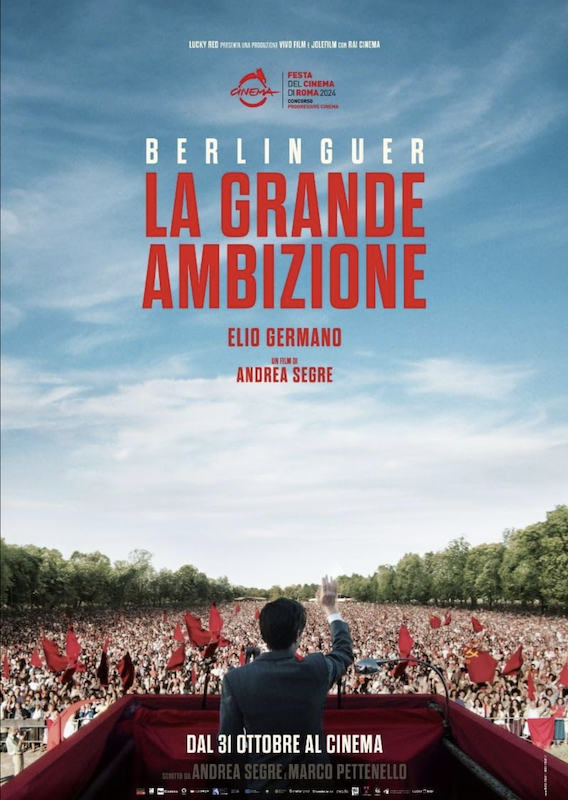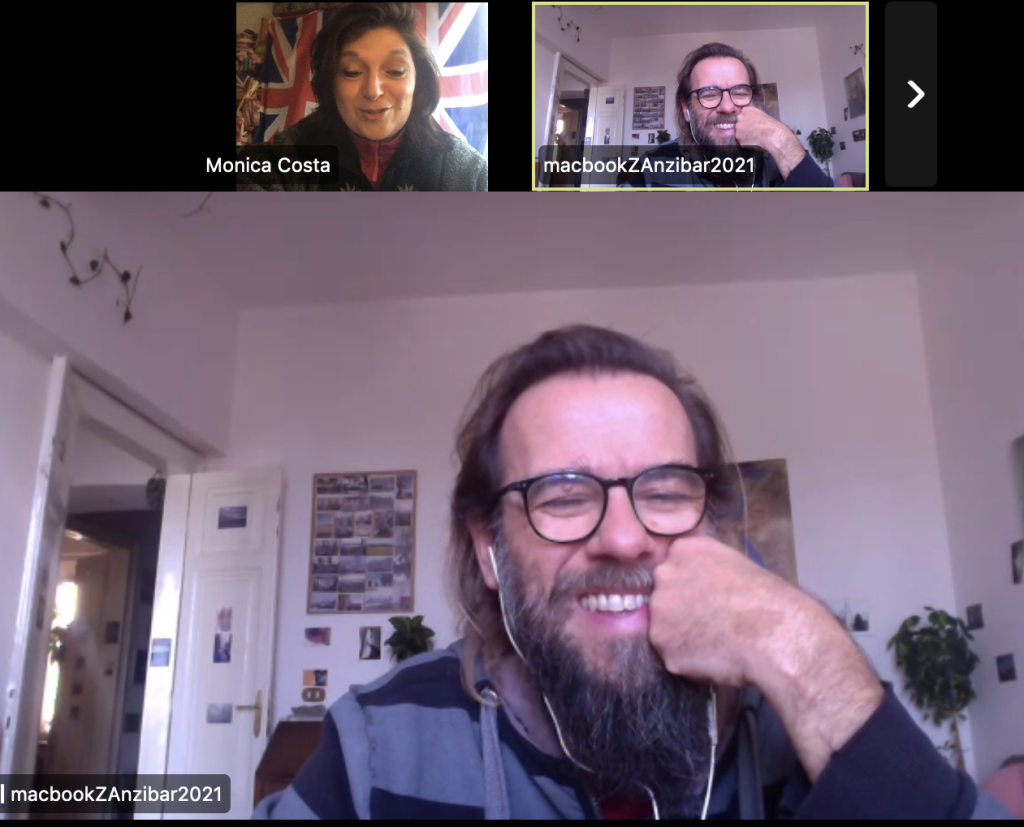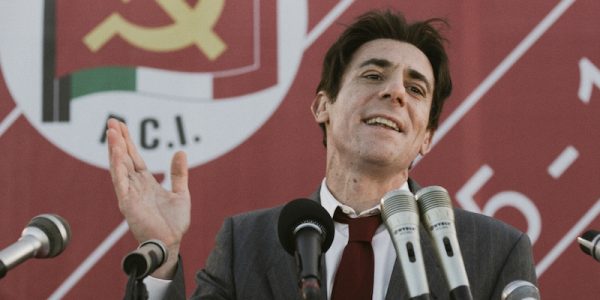The recent film Berlinguer – The Great Ambition, directed by Andrea Segre and released in Italian cinemas on 31 October 2024, and recently released at Cinema Made in Italy 2025 in London, has brought Enrico Berlinguer, the historic leader of the Italian Communist Party in the 1970s and 1980s, back into the spotlight. Played by Elio Germano, the film explores Berlinguer’s life and political legacy, stirring a renewed nostalgia for an era characterised by strong ideals and political engagement.
This article is available in Italian at the bottom of this page. – L’articolo è disponibile in italiano in fondo a questa pagina.

A particularly significant aspect of his legacy is reflected in his funeral, which took place in Rome on 13 June 1984, with over one million people attending – one of the largest public displays of mourning in Italian history. For context, the funeral of Queen Elizabeth II in 2022 saw around 250,000 people in London, highlighting the extraordinary level of public mobilisation for Berlinguer.
This renewed interest in Berlinguer highlights the desire of many Italians to rediscover a politics based on authentic values and constructive dialogue.

Meeting Andrea Segre
The first time I came across your work was through Paolo Pierobon. A year and a half ago, I interviewed him, and during our conversation, he spoke about your film Welcome Venice. I later watched L’ordine delle cose (I think that’s the title) and I must say I thoroughly enjoyed both films. So, I was really looking forward to seeing your latest one, and indeed, I loved it. Clearly, your style particularly resonates with me; I find it truly beautiful.
I wanted to ask: what inspired you to make a film about Enrico Berlinguer? He is quite a remarkable figure.
Andrea Segre:
The fact that there was no fictional film about Berlinguer or the Italian Communist Party seemed like a significant gap in the history of cinema. I also wanted to tell the human condition of those who organise themselves for an impossible dream. I think this existential and dramatic tension is fascinating, tied to an antithesis that runs through our lives: the sense that because dreams are impossible, it’s better to let them go.
Yet, that community consciously chose to take on an impossible dream and mobilised to realise it. These are two very different perspectives, and I thought it would be interesting to tell one to reflect on the other.
I believe that all dreams are impossible. But the extraordinary thing is to work together to try to realise them, not alone. Because doing it together means generating energy, creating a path. Acting alone can make us more or less skilled, but it has little to do with happiness.
The Great Challenge – Berlinguer’s Funeral More Attended Than Queen Elizabeth’s
The weight of telling such an iconic figure is a great responsibility. Our main challenge was not to rely solely on the nostalgia and melancholy of those who remember and lived through that era. We focused on telling the challenge it represented, so that it could be understood not only rationally but also emotionally by those who didn’t live through it.
Elio Germano as Berlinguer and the Disillusionment of Today’s Politics
Monica:
I found Elio Germano’s performance as Berlinguer extraordinary. It almost seemed as though he was born to play him! Incredible. He’s an amazing ‘chameleon’, even with the Sardinian accent – you completely forget that it’s Elio Germano.
There was a time when politics was a passion and mobilised millions of people. The squares were full, the stations crowded. Today, however, there seems to be a strong sense of disillusionment. Once there was passion, ideals… Why does it seem like all of that has disappeared today? Berlinguer was an idealist: what would he say about this disillusionment?
Andrea Segre:
Society has changed, and also because that dream was tied to a force that has failed.
Even though Berlinguer distanced himself from the Soviet Union, the link to that reality was inevitable.
What I discovered by meeting many young people who have seen the film is that there is still a huge need for collective action, a desire to claim space for a dream. And the truth is, young people are trying. They’ve created powerful movements around climate, feminism, immigration, and citizenship. They’ve launched strong actions and battles.
Perhaps we have judged them naively, thinking that their movements were less important than the great socialist movements of the past. But in reality, they should be supported strongly.
We must also consider one fact: today’s youth are numerically much fewer than before. Back then, the average age was 24; today it’s 45-47 years old. It’s a completely different society, where it’s much harder to mobilise.
Moreover, there is a general tendency today to reduce collective spaces. Yet, within these spaces lies a fundamental part of the meaning of life.
If Berlinguer Were Alive Today…
Andrea Segre:
He would say, “Have you seen what happens when you leave the market completely free?”
We live in a profoundly unequal society. Sure, material conditions have improved: we have warmer homes, more comfortable cars, and perfect phones. But inequality is rampant. It’s normal that a few people can earn millions of euros playing with a ball or clicking a button to buy stocks, while at the same time someone dies of hunger.
He would also say, “Have you seen what happens when you leave the market free in the relationship between war and peace?”
We are in a much more warlike world than before. There’s an exponential increase in military investment, never seen before. The arms industry is more powerful than ever.
And still, “Have you seen what happens to democracy when everything is left in the hands of the market?”
Today, politics is in the hands of tycoons. He could only say, “I told you so.” The problem is that no limits have been placed on the market.
Berlinguer believed that leaving the market economy without social regulations would lead to an apparent improvement in material conditions, but would actually cause an explosion of inequalities, a strengthening of financial and military powers, and the “splintering” of society, which would lose social solidarity and participation. And without participation, there’s no democracy.
At the same time, today, he would also understand the limits of the socialist model he once advocated. If you try to make a revolution by replacing the market with state power, inevitably that state becomes totalitarian. And that’s the greatest lesson to learn.
Berlinguer’s Integrity: A Value That Is Crumbling?
Andrea:
Yes, Berlinguer was an honest person. But honesty is not the true legacy of his figure.
If you have integrity but no ideas, you’re worth nothing.
And, above all, Berlinguer-like figures don’t emerge if collective participation is lacking.

Andrea Segre – Il nuovo film “Berlinguer – La grande ambizione”
Il recente film “La grande ambizione”, diretto da Andrea Segre e uscito nelle sale italiane il 31 ottobre 2024, ha riportato alla ribalta la figura di Enrico Berlinguer, storico leader del Partito Comunista Italiano negli anni ’70 e ’80. Interpretato da Elio Germano, il film esplora la vita e l’eredità politica di Berlinguer, suscitando una rinnovata nostalgia per un’epoca caratterizzata da ideali forti e impegno politico. ?
Un aspetto particolarmente significativo della sua figura è rappresentato dai suoi funerali, tenutisi a Roma il 13 giugno 1984, ai quali parteciparono oltre un milione di persone, una delle manifestazioni di cordoglio più imponenti nella storia italiana. ?
Per contestualizzare, il funerale della Regina Elisabetta II nel 2022 vide la partecipazione di circa 250.000 persone a Londra, evidenziando la straordinaria mobilitazione popolare per Berlinguer.?
Questo rinnovato interesse per la figura di Berlinguer evidenzia il desiderio di molti italiani di riscoprire una politica basata su valori autentici e dialogo costruttivo.?
L’incontro con Andrea Segre
La prima volta che mi sono avvicinata al tuo lavoro è stato grazie a Paolo Pierobon. Un anno e mezzo fa l’ho intervistato, ci siamo sentiti e mi ha parlato del vostro film Welcome Venice. Da lì ho poi visto anche L’ordine delle cose (mi sembra si chiami così) e devo dire che entrambi mi sono piaciuti tantissimo. Quindi, non vedevo l’ora di vedere anche questo ultimo film e, infatti, mi è piaciuto molto. Evidentemente il tuo stile mi colpisce particolarmente, lo trovo davvero bello.
Volevo chiederti: cosa ti ha spinto a realizzare un film su Enrico Berlinguer? È un personaggio particolare.
Andrea Segre: Il fatto che non esistesse un film di finzione su Berlinguer e sul Partito Comunista Italiano mi sembrava un vuoto piuttosto pesante nella storia del cinema. Inoltre, avevo voglia di raccontare la condizione umana di chi si organizza per un sogno impossibile. Trovo che sia una tensione esistenziale e drammaturgica molto interessante, legata anche a un’antitesi che attraversa le nostre vite: la sensazione che, siccome i sogni sono impossibili, sia meglio lasciar perdere.
Invece, quella comunità sceglieva consapevolmente di porsi un sogno impossibile e mobilitarsi per realizzarlo. Sono due posizioni molto diverse e mi sembrava interessante raccontarne una per riflettere anche sull’altra.
Io credo che tutti i sogni siano impossibili. Ma la cosa straordinaria è attivarsi per realizzarli insieme, non da soli. Perché farlo insieme significa generare energia, creare un percorso. Attivarsi da soli può renderci più o meno bravi, ma ha poco a che fare con la felicità.
La grande sfida – Il funerale di Berlinguer più partecipato di quello della Regina
Il peso di raccontare una figura così iconica è una grande responsabilità. La nostra sfida principale è stata non giocare solo sulla leva della nostalgia e della malinconia di chi si ricorda e ha vissuto quell’epoca. Ci siamo concentrati sul racconto della sfida che rappresentava, in modo che potesse essere compresa non solo razionalmente, ma anche emotivamente, da chi quell’epoca non l’ha vissuta.
Elio Germano nei panni di Berlinguer e il disincanto della politica di oggi
Monica: Ho trovato straordinario Elio Germano nel ruolo di Berlinguer. Sembra quasi nato per interpretarlo! Pazzesco. Lui è un trasformista incredibile, persino con l’accento sardo: ci si dimentica completamente che è Elio Germano.
Erano anni in cui la politica appassionava e mobilitava milioni di persone. Le piazze erano piene, le stazioni affollate. Oggi, invece, sembra esserci un forte disincanto. Una volta c’era passione, ideali… Perché oggi tutto questo sembra svanito? Berlinguer era un idealista: cosa direbbe di questa disillusione?
Andrea: È cambiata la società collettiva, e poi anche perché quel sogno era legato a una potenza che ha fallito.
Anche se Berlinguer si allontanava dall’Unione Sovietica, il legame con quella realtà era inevitabile.
Quello che ho scoperto incontrando tanti giovani che hanno visto il film è che esiste ancora un grande bisogno di azione collettiva, di voglia di prendersi uno spazio per un sogno. E la verità è che i ragazzi ci stanno provando. Hanno creato movimenti potentissimi legati al clima, al femminismo, all’emigrazione, alla cittadinanza. Hanno dato vita ad azioni e battaglie molto forti.
Forse li abbiamo giudicati ingenuamente, pensando che i loro movimenti fossero meno importanti rispetto ai grandi movimenti socialisti del passato. Ma in realtà andrebbero sostenuti con forza.
Dobbiamo anche considerare un dato di fatto: i giovani oggi sono numericamente molti meno di un tempo. All’epoca, l’età media era di 24 anni, oggi è di 45-47 anni. È una società completamente diversa, in cui è molto più difficile mobilitarsi.
Inoltre, oggi c’è una tendenza generale a ridurre gli spazi collettivi. Eppure, dentro questi spazi si nasconde un pezzo fondamentale del senso della vita.
Se Berlinguer fosse vivo oggi…
Andrea: Direbbe: “Avete visto cosa succede a lasciare il mercato completamente libero?”
Viviamo in una società profondamente diseguale. Certo, le condizioni materiali sono migliorate: abbiamo più case riscaldate, macchine più comode, telefonini perfetti. Ma la disuguaglianza è dilagante. È normale che poche persone possano guadagnare milioni di euro giocando con un pallone o cliccando un pulsante per comprare azioni, mentre nello stesso momento qualcuno muore di fame.
Direbbe anche: “Avete visto cosa succede lasciando il mercato libero sul rapporto tra guerra e pace?”
Siamo in un mondo molto più bellico di allora. C’è una crescita esponenziale degli investimenti negli armamenti, mai vista prima. L’industria bellica è più potente che mai.
E ancora: “Avete visto cosa succede alla democrazia se si lascia tutto nelle mani del mercato?”
Oggi la politica è in mano ai tycoon. Non potrebbe che dirci: “Io ve l’avevo detto.” Il problema è che non sono stati posti limiti al mercato.
Berlinguer credeva che lasciare l’economia di mercato senza regolazioni sociali avrebbe portato a un apparente miglioramento delle condizioni materiali, ma in realtà avrebbe causato un’esplosione delle disuguaglianze, un rafforzamento dei poteri finanziari e militari, e lo “spappolamento” della società, che avrebbe perso solidarietà sociale e partecipazione. E senza partecipazione, non c’è democrazia.
Allo stesso tempo, oggi comprenderebbe anche i limiti del modello socialista che aveva davanti. Se provi a fare una rivoluzione sostituendo al mercato il potere dello Stato, inevitabilmente quello Stato diventa totalitario. E questa è la lezione più grande da imparare.
L’integrità di Berlinguer: un valore che si sta sgretolando?
Andrea: Sì, Berlinguer era una persona onesta. Ma non è l’onestà il vero lascito della sua figura.
Se hai integrità ma non hai idee, non vali nulla.
E, soprattutto, non nascono dei Berlinguer se manca la partecipazione collettiva.
Related articles



